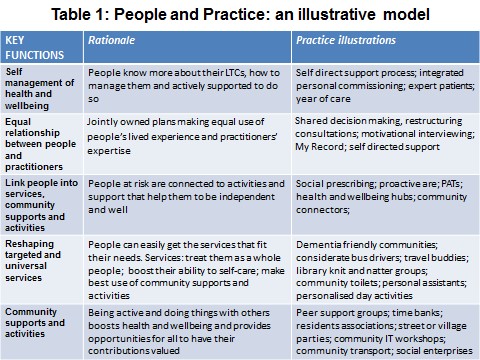Integration but not as we know it
The momentum for sharing information and best practice on community capacity building has gained pace with a series of TLAP regional events and practitioners network meetings. A further regional event is scheduled for the Autumn. Stakeholders have included chief executives of NHS England, Public Health England, NHS Confederation, NHS Alliance and leaders from social care and the voluntary & community sector. Amongst the policy documents cited are TLAP's key framework -Developing the power of strong, inclusive communities.
Here Clive Miller, the author, sets out the approach which will enable the much more effective co-production of outcomes.
Everybody agrees that better integration across health, social care and other services is essential to enable people who use services to be in control, improve outcomes and reduce costs. In the past integration focused on smoothing out the connections between health and social care commissioners and providers and the processes that they use. The aim was to achieve better service to service integration and staff utilisation. This was later widened to include to person-centred, multi-sector integration with a focus on health and wellbeing and its determinants as well as the roles played by the full range of public, voluntary and commercial organisations across all relevant sectors. Think Local Act Personal's (TLAP) framework Developing the power of strong, inclusive communities takes the vision of integration another stage forward by proposing an asset-based approach to integration.
The TLAP framework draws on the emerging evidence about the way in which people and their communities, along with services, come together to improve outcomes and consequentially reduce costs. Trialled by seven trailblazing Health and Wellbeing Boards (HWBs) the framework enables people who use services and their local communities, along with services, to make best use of their joint assets to more effectively coproduce improved outcomes. This involves linked work on developing community self-help and redesigning both universal and targeted services.
West Sussex, one of the trailblazing HWBs, used the TLAP framework to develop an asset- based approach to integration. This both widens and refocuses the current view of integration by putting the role that people and communities can play in coproducing health and wellbeing, at the centre of integration. Previously integrations aimed to improve service to service integration, albeit in a person centred way, by making best use of the combined assets of organisations. The asset-based approach builds on this by widening the view of assets to include those of people who use services and their communities. Organisational processes and services are then redesigned to enable effective joint use of the complete range of assets. This includes rebalancing the power between practitioners and people who use services and communities. The emerging evidence shows that this approach will enable the much more effective co-production of outcomes.
West Sussex is exploring ways in which to take forward the asset-based approach. It recognises that it will have to be tailored to both the differing local circumstances across the county and the health and wellbeing outcomes being targeted. One possibility under active consideration is to use the new approach to improve outcomes for people with two or more long term conditions (LTCs). This draws on the evidence that having two + LTCs is strongly associated with loss of independence and increased calls on services. As these people are highly likely to be known to the health service GP practices are to be used as the way of making contact. This will enable people to be put into contact with services and community supports that will enable them to actively self-manage their conditions. As services are not currently oriented to working in this way this will require a number of changes - outlined in table 1.


Comments
Posted on by Jeanne Carlin
Good to read some different thinking on the issue of integration with puts 'co-production' at the heart
Add your comment